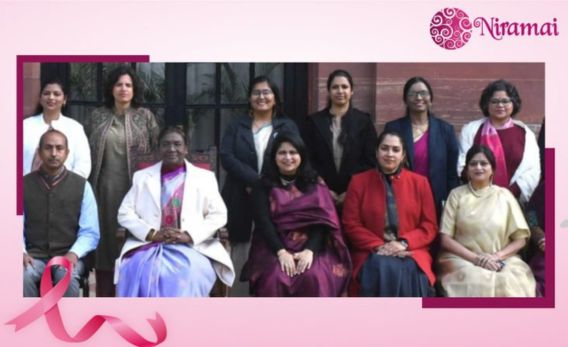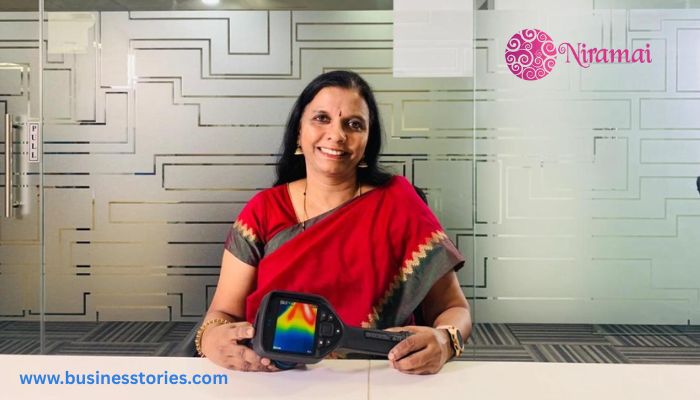Breast cancer is one of the most common cancers affecting women worldwide. Early detection is important for the disease because when it comes to treatment, the earlier you catch this cancer, the better the chances are of treating it and helping a woman live with breast cancer. But many women and especially in rural areas or underserved populations, lack access to affordable screening that works efficiently.
Niramai Health Analytix is a Bengaluru-based health-tech startup that is transforming breast cancer detection using Artificial Intelligence (AI) and Thermal Imaging. Founded in 2016 by Dr. Geetha Manjunath and Nidhi Mathur, Niramai (which stands for Non-Invasive Risk Assessment with Machine Intelligence) offers a radiation-free, painless, and portable solution to traditional mammography.
The Founders: A Vision to Make Breast Cancer Screening Accessible
Dr. Geetha Manjunath – The Tech Pioneer
Dr. Geetha Thamilarasu, a PhD in Computer Science from the Indian Institute of Science (IISc), has more than two decades of experience in AI and data analytics at reputed research labs like Xerox and HP. With her passion for applying AI to healthcare, she looked at non-invasive ways of diagnostics.
Nidhi Mathur – The Business Strategist
With an MBA from IIM Bangalore, Nidhi, brought a lot of business knowledge to the board. Her experience in strategy, marketing, and operations at companies like Microsoft and Unilever helped shape Niramai’s go-to-market strategy.
The “Aha!” Moment
During her research, Dr. Geetha came across thermal imaging, which can detect early breast cancer through assessment of temperature variations in the breast tissue. But manual interpretation of thermal images was subjective and could contain human error.
She realized that AI could automate and enhance accuracy, making screening more reliable and scalable. With Nidhi Mathur on board, they co-founded Niramai in 2016, with a mission to democratize breast cancer screening.
Also Read: Tricog Health: Revolutionizing Cardiac Care with AI
The Breakthrough: How Niramai’s Technology Works
Niramai’s solution, Thermalytix, combines high-resolution thermal imaging with AI-powered analytics to detect breast abnormalities. Here’s how it works:
1. Non-Invasive Thermal Imaging
- The patient sits in front of a thermal camera, which captures heat patterns from the breast.
- Unlike mammograms, this method is radiation-free, painless, and does not require breast compression.
2. AI-Powered Analysis (Thermalytix)
- Niramai’s proprietary AI algorithm (SMILE – Stochastic Multiclass Intervention Learning Engine) analyzes thermal images.
- It detects subtle temperature variations that may indicate tumors, even at early stages (Stage 0 or Stage 1).
3. Automated Diagnostic Report
- The AI generates a detailed risk assessment report within minutes.
- It highlights suspicious regions, helping doctors make informed decisions.
Key Advantages Over Traditional Methods
✅ No Radiation – Safe for frequent screenings.
✅ Painless & Non-Invasive – No compression or needles.
✅ Portable & Affordable – Can be used in rural clinics.
✅ High Accuracy – Detects tumors as small as 2mm.
The Impact: Saving Lives with Early Detection
Since its launch, Niramai has:
✔ Screened over 50,000 women across India.
✔ Detected early-stage cancers in asymptomatic women.
✔ Partnered with hospitals, diagnostic centers, and corporates for employee health programs.
Recognition & Awards
🏆 Winner of “AI Startup of the Year” (2019) – NASSCOM
🏆 Listed among “Top 10 Most Innovative AI Companies in India” – Analytics India Magazine
🏆 Received grants from Bill & Melinda Gates Foundation and Government of India

The Business Growth: Funding, Expansion, and Future Plans
Funding & Investors
Niramai has secured over $7 million in funding from a group of prominent investors, fuelling its mission to revolutionize cancer detection. Leading the investment round are Pi Ventures and Ankur Capital, both known for backing deep-tech and AI-driven healthcare startups. Additional support comes from Axilor Ventures, a strong advocate for early-stage innovation in India.
The startup also attracted funding from Sony Innovation Fund, highlighting global confidence in its AI-powered Thermalytix technology. These investments have enabled Niramai to expand its R&D, clinical trials, and market reach. The backing of such reputed investors underscores the potential of its non-invasive breast cancer screening solution.
With this financial boost, Niramai to further expand its operations and grow its international footprint. The funds will support advancements in AI diagnostics, partnerships with healthcare providers, and expansion into new markets. This strong investor trust reinforces Niramai’s role as a pioneer in AI-driven healthcare innovation.
Expanding Reach
Through strategic collaborations with leading healthcare institutes like Apollo Hospitals, HCG, and Tata Medical Centre across the country, Niramai Health Analytix has deep penetration in India.
The partnerships have allowed the company to integrate Thermalytix technology with conventional diagnostic workflows, making AI-based breast cancer screening accessible on a wider scale to women living in urban and semi-urban areas. Partnering with recognized hospital chains, Niramai makes sure that its state-of-the-art solution reaches more patients and gives it clinical credibility, helping doctors trust the results.
Beyond India, Niramai is making strides in global expansion, with pilot programs underway in Africa, Southeast Asia, and Europe. These initiatives aim to address the critical gap in early cancer detection in regions with limited access to traditional mammography. Through testing its technology in a variety of populations, Niramai is not only proving its efficacy among different demographic groups but also setting the stage for mass adoption across emerging and developed markets.
This worldwide reach demonstrates the company’s goal to democratize cancer detection around the world, which it is doing via low-cost, non-invasive AI diagnostics.
Future Vision
This would take Niramai Health Analytix to the next level by providing at-home screening kits for enabling women to conduct self-exams and breast cancer monitoring at home with added privacy. These portable kits with a seamless AI-enabled analysis will allow users in rural areas or underserved communities to catch early signs of abnormalities without having to visit a clinic, thus bringing about an avalanche of reach.
In addition, Niramai is on a mission to extend its patented breakthrough Thermalytix technology to detect thyroid and skin cancers by adapting the non-invasive thermal imaging approach for AI-based diagnostics, not only making it safer but also more economical compared to traditional methods.
In parallel, Niramai is also developing an integration with telemedicine platforms for global access so that patients can seamlessly share the diagnostic reports online with doctors and have consultations remotely. This integration will bridge the gap between early detection and timely medical intervention, particularly in regions with limited healthcare infrastructure.
Niramai envisions a future where AI-based diagnostics enables preventive healthcare for everyone, merging at-home testing, multi-cancer detection, and telemedicine connectivity.
Challenges & Lessons for Entrepreneurs
- Regulatory Hurdles
- Getting approvals for AI-based diagnostics was tough. Niramai worked closely with CDSCO (India’s medical device regulator) to ensure compliance.
- Changing Mindset
- Convincing doctors to trust AI over traditional mammography required extensive clinical validation.
- Scaling in Rural Areas
- Deploying portable devices in low-resource settings needed partnerships with NGOs and govt. bodies.
Also Read: Top 10 Surgeons In India: Your Complete Guide To The Best Specialists In Every Field
Key Takeaways for Startups
Deep-tech requires patience—R&D takes time, especially in AI-driven healthcare where accuracy and safety are critical. Clinical validation is crucial for health-tech credibility, as doctors and patients need proof of efficacy before adoption. Partnerships with hospitals and insurers accelerate real-world implementation, helping scale innovative solutions faster.
Collaborating with medical institutions builds trust and ensures compliance with regulatory standards. Early-stage health-tech startups must balance innovation with rigorous testing to gain market acceptance. Strategic alliances with insurers can also drive affordability and wider accessibility for patients.
“By blending cutting-edge AI with compassionate healthcare, Niramai is not just detecting cancer early — it’s redefining what accessible, life-saving innovation looks like.”
Conclusion:
Niramai Health Analytix is a shining example of how AI can bridge gaps in healthcare accessibility. By making early, accurate, and affordable breast cancer screening available to all, they are saving lives and setting a global benchmark.
For entrepreneurs, Niramai’s story teaches us that innovation, persistence, and a strong mission can lead to breakthroughs that change the world.



